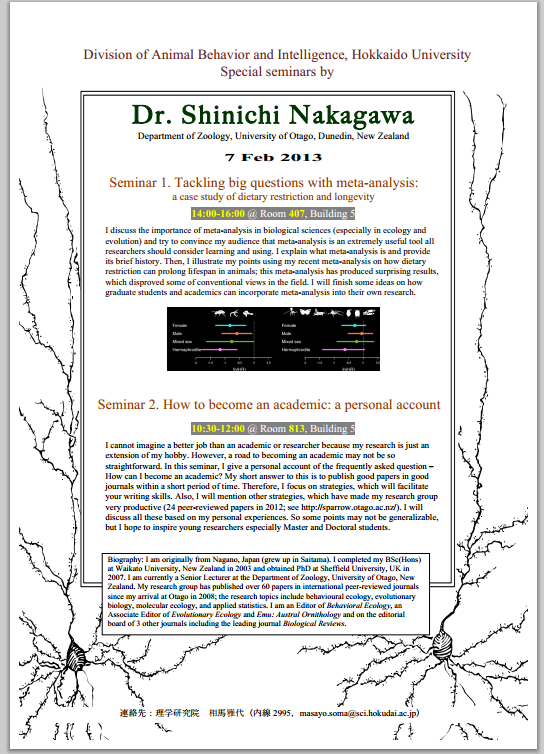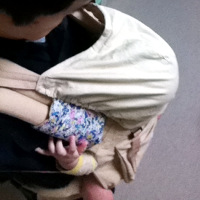理学部の相馬さんからセミナー案内をいただきました
(PDF file).
これはなかなかおもしろそうだな
……
NZオタゴ大学でPIをされている中川震一氏(http://sparrow.otago.ac.nz/)
一時帰国の機会をとらえて,メタ分析についての講演を依頼しました.
また,非常に精力的に研究をされているので,学生むけに,
研究者として生き残るには,という講演もしていただきます.
メタ分析については,生態学よりの話になると思いますので,
どうかご周知いただけたらと思い,ご連絡差し上げた次第です.
2講演とも,理学部5号館で2月7日におこなわれ,言語は英語です.
-------------------------------------
(1) “Tackling big questions with meta-analysis: a case study of
dietary restriction and longevity”
14:00-16:00 @ Room 407, 理学部5号館, 7 Feb 2013
(2) “How to become an academic: a personal account”
10:30-12:00 @ Room 813, 理学部5号館, 7 Feb 2013
-------------------------------------
Two seminars by Dr Shinichi Nakagawa, Department of Zoology,
University of Otago, Dunedin, New Zealand
Seminar 1 “Tackling big questions with meta-analysis: a case study of dietary
restriction and longevity”
I discuss the importance of meta-analysis in biological sciences (especially in
ecology and evolution) and try to convince my audience that meta-analysis is an
extremely useful tool all researchers should consider learning and using. I explain
what meta-analysis is and provide its brief history. Then, I illustrate my points
using my recent meta-analysis on how dietary restriction can prolong lifespan
in animals; this meta-analysis has produced surprising results, which disproved
some of conventional views in the field. I will finish some ideas on how graduate
students and academics can incorporate meta-analysis into their own research.
Seminar 2 “How to become an academic: a personal account”
I cannot imagine a better job than an academic or researcher because my research
is just an extension of my hobby. However, a road to becoming an academic may not
be so straightforward. In this seminar, I give a personal account of the frequently
asked question – How can I become an academic? My short answer to this
is to publish good papers in good journals within a short period of time. Therefore,
I focus on strategies, which will facilitate your writing skills. Also, I will
mention other strategies, which have made my research group very productive
(24 peer-reviewed papers in 2012; see http://sparrow.otago.ac.nz/).
I will discuss all these based on my personal experiences. So some points may not
be generalizable, but I hope to inspire young researchers especially Master and
Doctoral students.


